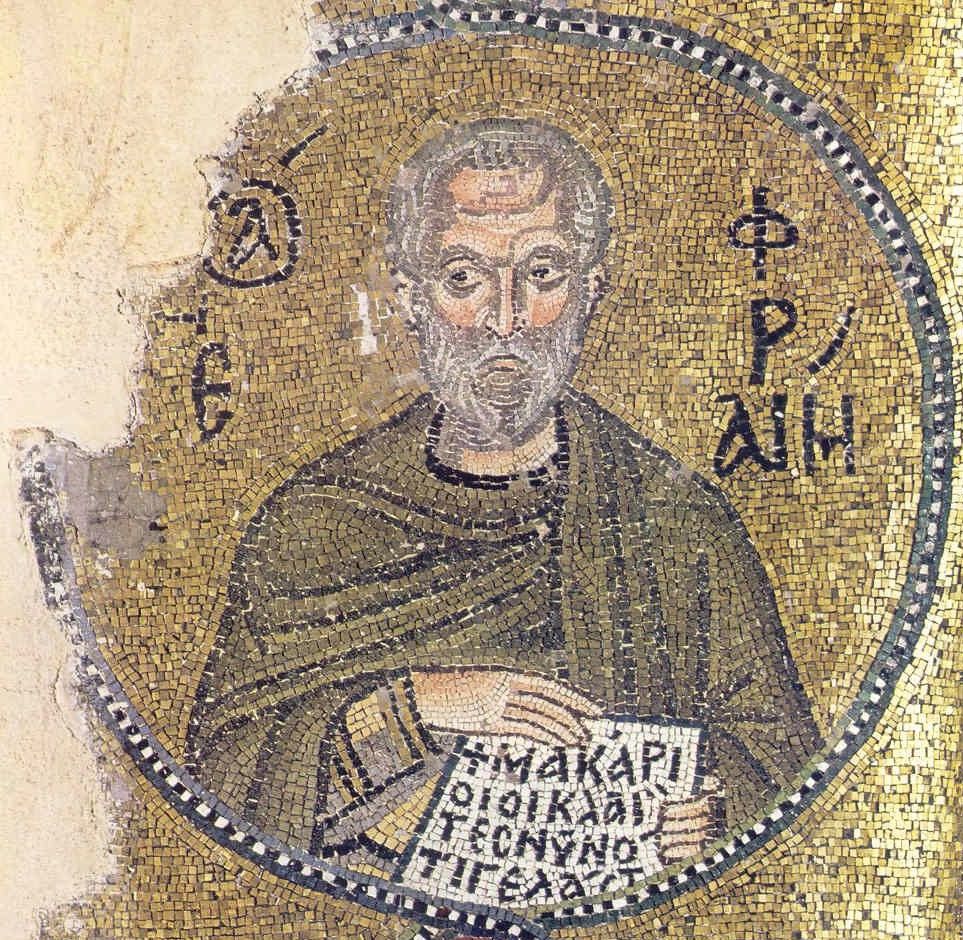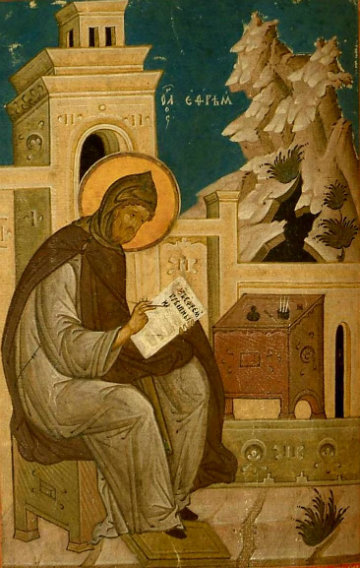
Catholic Saints
Saint Ephrem the Syrian (c. 306–373 AD), hailed as the "Harp of the Spirit," was a deacon, hymnographer, and theologian whose prolific works enriched Syriac Christianity in the fourth century. Born in Nisibis, Mesopotamia (modern-day Nusaybin, Turkey), he served as a teacher and defender of orthodoxy, crafting over 400 hymns and extensive biblical commentaries. After the fall of Nisibis to the Persians in 363 AD, he relocated to Edessa, where he lived as an ascetic and continued his ministry. Known for countering heresies like Arianism through poetic theology, Ephrem’s writings, including Hymns on Paradise, remain a cornerstone of Eastern Christian tradition. Declared a Doctor of the Church in 1920 by Pope Benedict XV, his feast is celebrated on June 9 in the Roman Catholic Church and January 28 in Eastern traditions, reflecting his universal reverence.
His feast day is celebrated on June 9 in the West and January 28 in the East.
Harp of the Spirit
Born around 306 AD in Nisibis, Mesopotamia, Saint Ephrem the Syrian stands as a luminous figure in early Christianity, renowned for his poetic theology and tireless service as a deacon. His hymns and writings, composed in the Syriac language, wove a rich tapestry of faith that countered heresies and uplifted the Church during a time of cultural and political upheaval.
Ephrem was born in Nisibis, a Syriac-speaking city on the frontier of the Roman Empire, around 306 AD, during the waning years of Diocletian’s persecution of Christians. Historical accounts differ on his family’s religious background—some suggest his father was a pagan priest of the goddess Abnil, while Ephrem’s own writings hint that both parents were Christians, nurturing him in faith from childhood. Under the guidance of Saint James, Bishop of Nisibis (303–338), Ephrem embraced Christianity fully, likely receiving baptism as a young adult. James, a participant at the Council of Nicaea in 325, mentored Ephrem, recognizing his potential and appointing him as a teacher in the burgeoning School of Nisibis, a center of Christian learning.
Living in a city repeatedly besieged by the Persian king Shapur II (338, 346, 350), Ephrem’s early life was shaped by both intellectual rigor and the stark realities of war. His role as a deacon under James and subsequent bishops—Babu, Vologeses, and Abraham—allowed him to serve the community through teaching and pastoral care, laying the foundation for his later prolific output. This period forged his deep commitment to the Church and his unique ability to express theology through poetry.
Ephrem’s education in Nisibis, steeped in Syriac traditions and scripture, equipped him to become one of the greatest hymnographers in Christian history. Recognizing the power of music used by heretics like Bardaisan to spread false teachings, Ephrem adapted popular melodies to compose orthodox hymns, transforming them into vehicles of truth. His poetic genius shone in works like the Hymns on Faith, where he countered Arianism and other errors with vivid imagery and theological depth, making complex doctrines accessible to the faithful.
In 363 AD, after the Roman Emperor Jovian ceded Nisibis to the Persians following Julian the Apostate’s failed campaign, Ephrem joined a wave of Christian refugees fleeing to Edessa (modern Şanlıurfa, Turkey). At around 57 years old, he settled in this Roman stronghold, a city teeming with theological diversity and heretical sects like Arians and Gnostics. Living as an ascetic in a cave overlooking Edessa, Ephrem continued his ministry as a deacon, teaching and preaching with fervor. His hymns from this period, such as those on the Nativity and Paradise, reflect a profound spirituality shaped by his experiences of displacement and devotion.
Despite the challenges of exile, Ephrem’s influence grew, as he engaged with the local Christian community and countered heresies through his writings. His encounters with figures like Saint Basil the Great in Caesarea (though debated by scholars) are said to have enriched his theological perspective, bridging Syriac and Cappadocian traditions. His steadfastness in Edessa earned him widespread respect, solidifying his role as a pillar of the Church.
Ephrem’s leadership in Edessa was marked by his relentless defense of orthodox Christianity. Facing threats from the Arian Emperor Valens, who besieged the city in the late 360s, Ephrem’s hymns bolstered the resolve of the Edessans, inspiring them to hold fast to their faith. His works, such as the Nisibene Hymns, recount the sieges of Nisibis and celebrate God’s deliverance, weaving a narrative of divine protection that resonated deeply with a beleaguered people. His ability to adapt theology to poetry ensured that his teachings reached beyond the learned elite to the common faithful.
Ephrem’s theological contributions are vast, encompassing over 400 surviving hymns, biblical commentaries, and prose works like his Commentary on the Diatessaron. His writings explore the Incarnation, the Trinity, and the beauty of creation with a lyrical intensity that earned him the title "Harp of the Spirit." He emphasized the real presence of Christ in the Eucharist, the intercession of saints, and the mystery of redemption, often using feminine imagery for the Holy Spirit and Mary, reflecting a uniquely Syriac perspective. His hymns were sung in churches, preserving orthodoxy in an era of doctrinal strife.
Ephrem’s influence extended beyond his lifetime, as his works were translated into Greek, Armenian, and Latin, inspiring figures like Saint Jerome, who praised his genius. His approach to scripture—rooted in faith rather than critical analysis—offered a poetic lens that complemented the philosophical discourses of his contemporaries, enriching the Church’s spiritual heritage.
As a pioneer of Christian hymnody, Ephrem’s works remain a bedrock of liturgical tradition, earning him recognition as a Doctor of the Church in 1920. His compositions, often performed by women’s choirs in Edessa, introduced song as a vital tool for worship and instruction, a practice that spread throughout the Christian world. His ecological sensitivity—seeing all creation as interconnected—and his championing of women’s roles in the Church highlight his forward-thinking theology, making him a timeless figure in Christian thought.
In his final years, Ephrem remained active in Edessa, emerging from his hermitage in 372 AD to organize relief efforts during a devastating famine. Distributing food and caring for the sick, he contracted an illness—likely plague—that led to his death on June 9, 373. His testament, a humble plea to be buried simply among the poor, reflects his lifelong asceticism and compassion. After his passing, his fame spread across Syriac, Byzantine, and Western churches, with contemporaries like Gregory of Nyssa and Jerome extolling his brilliance.
Celebrated on June 9 in the Roman Catholic Church and January 28 in Eastern traditions, Ephrem’s legacy as the "Sun of the Syrians" endures, his hymns and writings a perpetual gift to the Church. His recognition as a Doctor of the Church underscores his profound impact on Christian theology and liturgy.
Ephrem’s life of service, poetic mastery, and theological depth continue to illuminate the Christian East and beyond. His courage in exile, his innovative use of hymns to teach and inspire, and his humble devotion offer a model of faith that transcends time. His works remain a source of spiritual nourishment, guiding believers toward the mysteries he so beautifully expressed.
“Blessed is He who made our body a dwelling place for His hiddenness.”
Born in Nisibis, Mesopotamia.
Born into a Christian family, mentored by Saint James.
Served as a deacon and teacher in Nisibis.
Began ministry under Bishop James.
Moved to Edessa after Nisibis fell.
Relocated and continued his work as an ascetic.
Organized aid during the Edessa famine.
Served the poor in his final year.
Died in Edessa.
Left a vast corpus of hymns and writings.

“Blessed is He who has appeared to our human race under so many metaphors. For He clothed Himself in our language, that He might refresh us by the wealth of His parables; and as He sought us in all things, He became visible to us in all things.”
Saint Ephrem the Syrian Quotes
"We give glory to you, Lord, who raised up your Cross to span the jaws of death like a bridge by which souls might pass from the region of the dead to the land of the living. We give glory to you who put on the body of a single mortal man and made it the source of life for every other mortal man."
“And if any one wishes to say, concerning something which to himself seems meet;--"It were meet for God to do this;" let him know that it is meet for himself not to speak thus concerning God. For the chief of all things meet is this: that a man should not teach God what is meet. For it becomes not man to become God's instructor.”
Let us avert by that which has been, the thing that is yet to be; let us be taught by that which has come, to escape that which is coming; let us remember that which is past, to avoid that which is future. Because we had forgotten the first stroke, the second fell on us; because we forgot the second, the third bore heavy on us. Who will yet again forget!
“Blessed be the Merciful One, who saw the weapon by Paradise, that closed the way to the Tree of Life; and came and took a Body which could suffer, that with the Door, that was in His side, He might open the way into Paradise.”
“You victorious martyrs who endured torments gladly for the sake of the God and Savior, you who have boldness of speech toward the Lord himself, you saints, intercede for us who are timid and sinful men, full of sloth, that the grace of Christ may come upon us, and enlighten the hearts of all of us so that we may love him.”
“Blessed is the one who sings to You, O Lord, with the harp of the heart.”